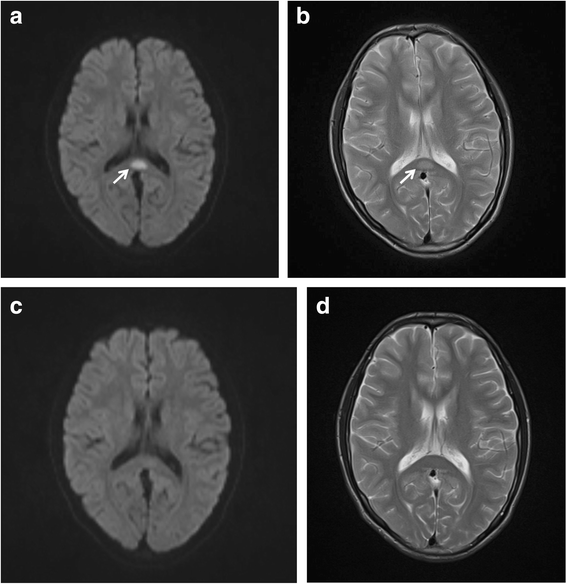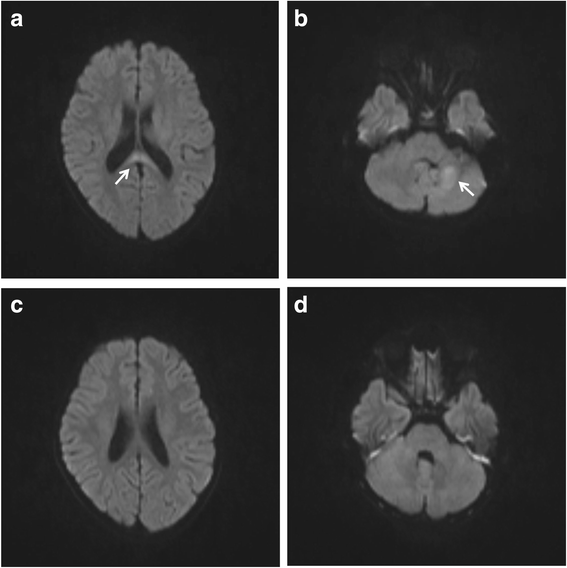Mycoplasma pneumoniae-associated mild encephalitis/encephalopathy with a reversible splenial lesion: report of two pediatric cases and a comprehensive literature review
- PMID: 27836006
- PMCID: PMC5106775
- DOI: 10.1186/s12879-016-1985-1
Mycoplasma pneumoniae-associated mild encephalitis/encephalopathy with a reversible splenial lesion: report of two pediatric cases and a comprehensive literature review
Abstract
Background: No literature review exists on Mycoplasma pneumoniae-associated mild encephalitis/encepharopathy with a reversible splenial lesion (MERS).
Methods: M.pneumoniae-associated MERS cases were searched till August 2016 using PubMed/Google for English/other-language publications and Ichushi ( http://www.jamas.or.jp/ ) for Japanese-language publications. Inclusion criteria were children fulfilling definition for encephalitis, M.pneumoniae infection, and neuroimaging showing hyperintensity in the splenium of the corpus callosum (SCC) alone (type I) or SCC/other brain areas (type II).
Results: We described two children with type I and II M.pneumoniae-associated MERS. Thirteen cases found by the search and our 2 cases were reviewed. Mean age, male/female ratio, duration of prodromal illness was 8.3 years, 1.5 and 3.5 days. The most common neurological symptom was drowsiness, followed by abnormal speech/behavior, ataxia, seizure, delirium, confusion, tremor, hallucination, irritability, muscle weakness, and facial nerve paralysis. Fever was the most common non-neurological symptom, followed by cough, headache, gastrointestinal symptoms, headache, lethargy and dizziness. Seizure and respiratory symptoms were less common. All were diagnosed for M.pneumoniae by serology. Cerebrospinal fluid (CSF) M.pneumoniae was undetectable by PCR in the 3 patients. Three patients were clarithromycin-resistant. Leukocytosis, positive C-reactive protein, hyponatremia, CSF pleocytosis and slow wave on electroencephalography frequently occurred. All except 2 were type I MERS. Neuroimaging abnormalities disappeared within 18 days in the majority of patients. All type I patients completely recovered within 19 days. Two type II patients developed neurological sequelae, which recovered 2 and 6 months after onset.
Conclusions: Prognosis of M.pneumoniae-associated MERS is excellent. Type II MERS may increase a risk of neurological sequelae.
Keywords: Encephalitis; MERS; Mycoplasma pneumoniae; Neuroimaging; Splenium of the corpus callosum.
Figures


Similar articles
-
Clinically mild encephalitis/encephalopathy with a reversible splenial lesion associated with Mycoplasma pneumoniae infection.BMC Infect Dis. 2016 May 26;16:230. doi: 10.1186/s12879-016-1556-5. BMC Infect Dis. 2016. PMID: 27230114 Free PMC article.
-
Mild encephalitis/encephalopathy with a reversible splenial lesion associated with systemic Mycoplasma pneumoniae infection in North America: a case report.J Med Case Rep. 2022 Feb 20;16(1):74. doi: 10.1186/s13256-022-03299-6. J Med Case Rep. 2022. PMID: 35183255 Free PMC article.
-
Transient blindness associated with mild encephalitis/encephalopathy with a reversible splenial lesion (MERS): a case report and review of literature.Ital J Pediatr. 2020 Oct 12;46(1):152. doi: 10.1186/s13052-020-00918-0. Ital J Pediatr. 2020. PMID: 33046117 Free PMC article. Review.
-
Atypical case of mild encephalopathy/encephalitis with reversible splenial lesion of the corpus callosum (MERS) associated with Mycoplasma pneumoniae infection in a paediatric patient.BMJ Case Rep. 2021 Aug 13;14(8):e242791. doi: 10.1136/bcr-2021-242791. BMJ Case Rep. 2021. PMID: 34389590 Free PMC article.
-
Mild encephalitis/encephalopathy with a reversible splenial lesion secondary to encephalitis complicated by hyponatremia: A case report and literature review.Medicine (Baltimore). 2019 Nov;98(47):e17982. doi: 10.1097/MD.0000000000017982. Medicine (Baltimore). 2019. PMID: 31764808 Free PMC article. Review.
Cited by
-
Neuro-ophthalmological manifestations as complication of an infection with Mycoplasma pneumoniae and subsequent development of disseminated acute encephalitis.Arch Soc Esp Oftalmol (Engl Ed). 2020 May;95(5):254-258. doi: 10.1016/j.oftal.2020.01.009. Epub 2020 Mar 5. Arch Soc Esp Oftalmol (Engl Ed). 2020. PMID: 32147128 Free PMC article.
-
Clinical Variability of Pediatric MERS: Insights from a Retrospective Observational Study.J Clin Med. 2025 Jun 12;14(12):4169. doi: 10.3390/jcm14124169. J Clin Med. 2025. PMID: 40565916 Free PMC article.
-
COVID-19-associated mild encephalitis/encephalopathy with a reversible splenial lesion.J Neurol Sci. 2020 Aug 15;415:116941. doi: 10.1016/j.jns.2020.116941. Epub 2020 May 27. J Neurol Sci. 2020. PMID: 32474220 Free PMC article.
-
A cohort study of mild encephalitis/encephalopathy with a reversible splenial lesion in children.Brain Behav. 2021 Aug;11(8):e2306. doi: 10.1002/brb3.2306. Epub 2021 Aug 1. Brain Behav. 2021. PMID: 34333864 Free PMC article.
-
Reversible splenial lesions presenting in conjunction with febrile illness: a case series and literature review.Emerg Radiol. 2017 Oct;24(5):599-604. doi: 10.1007/s10140-017-1516-4. Epub 2017 May 18. Emerg Radiol. 2017. PMID: 28523438 Review.
References
Publication types
MeSH terms
LinkOut - more resources
Full Text Sources
Other Literature Sources
Medical
Research Materials

